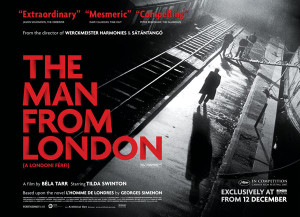I’m working on a new book project that’s an analysis of the various ways in which art cinema is positioned as something of special cultural value. Among various other perspectives, I’m considering the marketing of such films. While marketing devices – posters, trailers, etc. – often include elements designed to highlight the particular quality of such films, they also have a habit of being, well, less than entirely honest. A common tendency is to ‘bend’ the way a film is presented towards the commercial mainstream. That is, to single out components that are most commercial in nature, to obscure ones that aren’t, and so on. This happens to various degrees, some subtle some very misleading.
An example that leans more towards the the latter is one trailer for Bela Tarr’s The Man from London (A londoni férfi, 2007) for the English-language market (see below) which cunningly included only English-language dialogue from the film – which is a tiny proportion of the whole. Surely not a deliberate intention to mislead? Er, yes, it seems so, although other aspects of the trailer do emphasise the more distinctive qualities of Tarr’s work.
It came as something of a heavy irony to me, then, when one publisher I’d approached with this project was unprepared to take it on with my original title – because their marketing department didn’t like it (and it’s not something wildly obscure). The title made this clearly primarily academic book seem ‘too academic’, I was told. That is, it accurately reflected the nature of the book. Sort of like accurately reflecting the nature of one of the films it’s about. Rather than trying to grab a wider audience by being a little bit misleading. So, yes, very ironic, I thought (and I’ll be taking it elsewhere as a result).
Further irony – and another link between film marketing and this kind of publication – is something else I’ve encountered in my work on this project so far. One book that I’m looking at as an example of a particular academic way of positioning such films has endorsements on the back cover filled with the kind of hype usually associated with Hollywood trailers: the ‘in a world where…’ variety that could be imagined being voiced in familiar trailer intonation. So, there seem to be some interesting parallels here, which suggest that we’re all part of the same broader world of media-cultural production of one kind or another, governed to varying degrees by bottom-line commercial considerations. Maybe this is inevitable but it’s never quite been driven home so clearly to me as in these instances.
In cases such as my book title and trailers such as that for The Man from London, there seems to be an attempt to reach a wider audience than that for which the product is designed. This seems somewhat pointless, to me. I’m not convinced that burying the real focus in a subtitle is going to make any great difference to who is going to buy one of my books, any more than playing games with which aspects of a film to foreground in a trailer is really going to fool anyone – and if it does, it’s likely only to cause poor word-of-mouth reception from those who feel tricked.

